September 30, 2016
Air Date: September 30, 2016
FULL SHOW
SEGMENTS
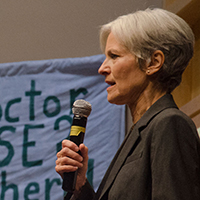
Jill Stein and the Planet
View the page for this story
Dr. Jill Stein is the 2016 Green Party nominee for President of the United States. In a wide-ranging interview with host Steve Curwood they discuss her “Green New Deal” to avert a climate emergency, her plans to scale back military spending, and why she participated in protests against the Dakota Access Pipeline that led to a warrant for her arrest. (14:30)

A Speedy Road for Paris
View the page for this story
The Paris climate Agreement was signed in December 2015, and there’s been rapid progress towards its implementation. 61 countries have ratified the accord, well above the required number. And, as David Waskow, Director of the World Resources Institute’s International Climate Initiative tells host Steve Curwood, if just a few more countries accede, the deal will reach the global emissions threshold required to finally bring it into force. (04:30)

SEC Probes Exxon
View the page for this story
The U.S. Securities and Exchange Commission is investigating whether ExxonMobil properly values its assets in relation to the regulatory risks associated with climate disruption and drastically reduced oil prices. ExxonMobil is also under scrutiny from some states’ attorneys-general, probing whether the company’s reporting to investors and the public reflects what it knew about climate change decades ago, as well as the accounting issues of interest to the SEC. Andrew Logan of nonprofit sustainability advocate Ceres, explains to host Steve Curwood how Exxon diverges from most oil and gas companies in such accounting. (07:10)

Paris Dirty Car Ban
View the page for this story
To reduce pollution in Paris, recent regulations ban cars built before 1997 from the city center during workdays. This move is expected to reduce emissions of particulate matter and nitrous oxide, a major public health issue in the city. Host Steve Curwood speaks to Hervé Levifve, a transportation expert in the office of the Deputy Mayor of Paris. (06:30)

BirdNote: Sandhill Cranes Wait Out the Storm
/ Mary McCannView the page for this story
Fall can be full of fruit and flashy foliage, but can also deliver wild winds and severe storms. As Mary McCann notes in this BirdNote, such weather can disrupt migration. (02:00)

Beyond the Headlines
/ Peter DykstraView the page for this story
In this week’s trip Beyond the Headlines, Peter Dykstra recaps portions of the September 26, 2016 presidential debate and climate change attitudes with host Steve Curwood and also discusses developments in energy politics. And in environmental history, he notes the legacy of the Society of Environmental Journalists in American news coverage. (05:00)

Urban Foraging at the End of Nature
View the page for this story
Many of today’s environmental writers grew up in urban landscapes, during economic recessions. But urban nature can also offer riches for those who are willing to look. University of New Mexico professor Amaris Ketcham reads and discusses her essay “Urban Foraging,” featured in a new collection, Coming of Age at the End of Nature. (05:55)
Show Credits and Funders
Show Transcript
HOST: Steve Curwood
GUESTS: Jill Stein, David Waskow, Andrew Logan, Hervé Levifve, Amaris Ketcham
REPORTERS: Mary McCann, Peter Dykstra
[THEME]
CURWOOD: From Public Radio International, this is Living on Earth.
[THEME]
CURWOOD: I'm Steve Curwood. The Securities and Exchange Commission is investigating whether ExxonMobil deceived shareholders by not taking account of slumping oil prices and the risks of climate change regulation.
LOGAN: Exxon seemed to be making these investments in a way that assumed that the world wouldn't take any serious action on climate change. And the fact right now is that the Paris Agreement is heading toward being put into force, and that it's going to have a very real impact on demand for oil and for the price of oil.
CURWOOD: Also, the aims and ideals of the Green Party.
STEIN: So our focus really is on a party of justice for a world of justice. We put people, planet and peace over profit and we call for an emergency jobs program to solve the emergency of climate change.
CURWOOD: Jill Stein, her vision and response to the charge of being a potential spoiler. That and more this week, on Living on Earth. Stick around.
[NEWSBREAK MUSIC: Boards Of Canada “Zoetrope” from “In A Beautiful Place Out In The Country” (Warp Records 2000)]
[THEME]
Jill Stein and the Planet
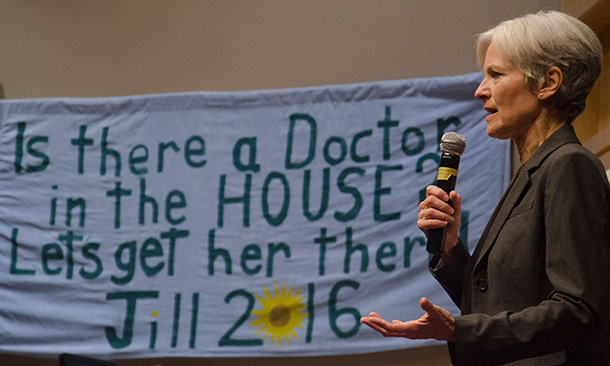
Jill Stein, the 2016 Green Party Presidential Nominee, at a September speaking engagement at Pennsylvania State University. (Photo: Penn State, Flickr CC BY-NC-ND 2.0)
CURWOOD: From the Jennifer and Ted Stanley Studios at the University of Massachusetts Boston and PRI, this is Living on Earth. I’m Steve Curwood. As the US national elections draw near, we are taking a look at the environmental records and plans of the presidential candidates, starting this week with Dr. Jill Stein of the Green Party. Pollsters report Dr. Stein currently attracts only about three percent of the vote. But though she has little or no chance to win, in a tight race her sliver of support could be the margin of defeat or victory for a major party candidate. Democrat Al Gore likely would have won in 2000 without the Green Party’s Ralph Nader on the ballot in Florida or New Hampshire. So, for insight into why the pollsters tell us some three million or more Americans could vote for Dr. Stein, she joined us for an interview in Cambridge, Massachusetts. Welcome to the program.
STEIN: Great to be with you, Steve.
CURWOOD: Let's start with talking about what the Green Party actually is. Many folks are kind of fuzzy about it. So tell me: What are your party’s core values, and why was it created?
STEIN: So, our focus really is on a party of justice for a world of justice. We put people, planet and peace over profit, and we recognize that people, planet, and peace all depend on each other. You can't get one without the other. You could say that we are the party of environmental justice, worker justice, racial justice, women's, LGBTQ justice, immigrant justice and sustainability, which is essentially justice for future generations. We are the one political party that does not take money from lobbying interests, from corporate interests and we do not have a SuperPAC, so you could say that we are the one campaign that actually has the liberty to stand up for what the American people are clamoring for. And we call for in a nutshell: an emergency jobs program to solve the emergency of climate change, to bring them together in a Green New Deal, like the New Deal that got us on the Great Depression.
CURWOOD: Now, let me ask you about your Green New Deal. How many jobs would you create, how long would this take, why is this plan an emergency and how do you plan to accomplish all this?
STEIN: We plan to accomplish all of this because we must accomplish all this. The Green New Deal declares that climate emergency, which is very real, every month now is setting a new world record for the month of that name in terms of heat, record storms, the fires up and down the west coast, the flooding in the southeast and sea level rise predictions now -- with Jim Hanson who hasn't been wrong yet, saying most recently that we can expect 10 feet and more of sea level rise as soon as 2060 is the date he put it at -- so it is an emergency and we must solve it.

America’s Green Party has its origins in a meeting of about 60 people that took place in St. Paul, Minnesota in 1984. (Photo: Scott Campbell, Flickr CC BY-NC-ND 2.0)
When Pearl Harbor was bombed at the outset of the second World War, it took us six months only to transform our economy, to a wartime footing because we recognized a national emergency. Right now we have a global emergency that actually makes Pearl Harbor look like small potatoes because we're not talking about one harbor, we're talking about all harbors, all coastal population centers that we will lose in a catastrophic hit to civilization that it will be very hard to survive. So we’re talking, not centuries away, we're talking in all likelihood this century and potentially within decades. So it is time to mobilize. We call for eliminating fossil fuels by 2030, which is what the science actually says we must do if we are to hold temperature rise to less than 1.5 degrees Centigrade such that we can survive. If we do that, we'd get so much healthier, in fact, that we'd save enough money to pay the costs of the green new deal within a decade or so. So this is a win-win. The other win, I might add, is that it makes the wars for oil obsolete, which also allows us to put our dollars then into true security here at home.
CURWOOD: What motivated you to join the Dakota Access Pipeline demonstrations a few months ago?
STEIN: Yes, I went there because the battle that's being fought there is a symbol. It is a microcosm of the global battles that are being fought. So this was a fight for human rights, for the rights of the indigenous people to protect their sacred sites and their historic gravesites which were being viciously attacked by the Dakota Access Pipeline company in the middle of the night a weekend in the most underhanded and nefarious kind of way. It was really outrageous. And then, as the indigenous people stood up the next day to say this is an outrage, they were attacked with a vicious attack dogs and with pepper spray simply for asserting their democratic rights, their civil rights, our First Amendment rights to protest for redress of grievances. It turns out it wasn't all that long afterwards that the President, in fact, chimed in to say, “yes, we should stop this” and then the courts chimed in to say, “yes, in fact this permit is illegitimate because the native people are supposed to give informed consent.” They have not been informed and they did not consent.
CURWOOD: So I understand there is a warrant for your arrest.
Jill Stein & Ajamu Baraka Face Charges after Graffitiing Dakota Access Machines https://t.co/O9kPOz3dzQ via @democracynow
— Ernest A. Canning (@cann4ing) September 8, 2016
STEIN: That's right, there is! And it's kind of funny they didn't decide to issue that warrant until I was on the airplane. Maybe they did not want me in their custody. I wonder, and I did not go there intending to participate in civil disobedience. I was just going to lend support and bear witness. But when I saw the incredible hardships and pain that they were enduring you know, a part of their historic legacy for hundreds of years and their courage stand up in the face of that, I felt I could not say no when several of the protesters came to me and asked me first to lockdown, and I was not prepared to lockdown. You don't want to do a lockdown, which is a dangerous thing, unless you've really given it thought. I said no and when they came back with a can of spray paint, asking me to spray not a piece of construction equipment, but a piece of destruction equipment that had just mowed down their historic graveside, I felt there was no way I could conscience not standing up with them. So what I wrote on the blade of this piece of destruction equipment and on which any writing is going to be scraped off within a matter of days if not hours, just by the trauma of its work, I wrote on that what I hoped would bring the strong support of my campaign, which was to say, "I approve this message."
CURWOOD: What are your plans in terms of dealing with this warrant? Are you going to go back to North Dakota and deal with this?
STEIN: Yes, when you undertake civil disobedience, you sign up for what the process is going to entail. And our attorneys have been trying to communicate with the authorities there, but I think they're pretty busy, so they've not gotten back to us yet, so we're trying to work that through. It may involve a visit, and we'll see what's required.
CURWOOD: Dr. Stein, there's been a lot of mutual support recently between the Black Lives Matter Movement and certain environmental campaigns. How are the goals of averting a climate disaster and institutionalized racism related?

Stein also received the Green Party’s nomination for president in 2012 and attended the Occupy Wall Street demonstrations that took place that year in downtown Manhattan. (Photo: Michael Fleshman, Flickr CC BY-SA 2.0)
STEIN: Very much related. In fact, I got my start fighting environmental racism here in Massachusetts working to close down the polluting medical waste incinerators in Lawrence and Lowell, a whole cluster of incinerators in one of the poorest and black and brown communities in New England, actually. You know, when we stand together and we stand strong, we win, and we've won many of those battles. Right now, you know, who is more on the firing line of climate justice than the communities of color in this country and around the world. The white community is not aware of the incredible price that's been paid by the African-American community, so we call for a real discussion on race. My running mate is an African-American who comes from an oppressed community and is very outspoken about this and really speaks in a whole different language which I think is really important. Our politics needs to speak many dialects to bring in many voters. Four out of 10 voters are predicted not to vote given politics as usual.
CURWOOD: Why do you want to cut at least half of all military spending?
STEIN: OK, so number one it's not making us safer. It's about half of your income tax right now that's actually going to the military, and it is more than half of our discretionary budget. We actually call for a new kind of offensive in the Middle East, a peace offensive which begins with a weapons embargo since we are supplying the majority of weapons which actually get into the hands of all parties, all combatants in the Middle East. We can get this started and work to bring along the Russians and the Chinese, but the Russians in particular are also struggling with the consequences of terrorism, the failed nature of these wars and with climate change for that matter, Russia having injured several droughts and reductions in their grain supply and so on, and they are massively impacted by their fossil fuels and the pollution and all that.
So we would like to lead the way, actually, in redirecting our massive dollars from competing for fossil fuels to instead actually phasing out fossil fuels to encourage the Russians and the Chinese because they too are bearing the burden here. Why don't we all just put those dollars into making fossil fuels obsolete and making the wars and the competition obsolete as well? Because why do we, the US, have approximately 800,000 bases in over 100 countries around the world? We are protecting our access to fossil fuel supplies and the roots of transportation. We are the only country in the world that does this. If you add up all the other foreign bases in all the other countries around the world it comes out to about 30.
CURWOOD: So, in getting ready for this interview Dr. Stein, a number of people commented on the Greens, "Oh the Greens are great, but she can't get elected," and what's worse -- and you get this question all the time -- it could be a spoiler situation."
STEIN: So what I can tell you is that in Florida where I know the numbers pretty well, any of the independent progressive parties could have make the difference. So are we done saying that there can be no independent political parties, that are we have are Democrats and Republicans? Or is it just the Greens that we’re saying, "You guys get out of the way because you are the environmental party, so you're too powerful. We have to silence an independent party."
CURWOOD: So, what's your solution?
STEIN: Well, here's an obvious solution. We can enact ranked choice voting right now and eliminate any splitting of the vote, any spoiling of the vote. By the way, the parties of abolition at the time of the movement to abolish slavery, they were also called spoiler parties because they were disrupting the system. So sometimes the system is so corrupt and so deadly that it needs to be spoiled if we're going to get out of here alive, and I would encourage people to actually look at the record. Because while there are differences between the Democratic and Republican parties, unfortunately, those differences are not enough to save your job. The Democrats are leading the charge for the TransPacific Partnership, NAFTA on steroids, that will send more jobs overseas.
CURWOOD: (interrupting) But wait a second. There are going to be people listening to this and say – remember in those battleground states where things are really tight, a few percentage points could make the difference between Hillary Clinton and Donald Trump.
STEIN: So, let me be clear. I will feel horrible if Donald Trump gets elected and I will feel horrible if Hillary Clinton gets elected. I think that banning Muslims from the country is not worse than bombing Muslims which Hillary Clinton has been very busy doing. I think that Donald Trump doesn't tell us what he's going to do in Syria, one can only imagine, but with Hillary Clinton we don't have to imagine because she wants to start an air war with Russia, a nuclear armed power over Syria. And we can see how well that turned out in Libya. So we're not going to get out of here alive with Hillary Clinton in the presidency if she gets her way, and by the way she's likely to have a much more complaint Congress than Donald Trump would. The Republicans are the party of hate and fear, but the Democrats are the party of deportation, detention, and night raids.
So there are differences, but the differences are not enough to save your life, not enough to save your job, and not enough to save the planet because under all of the above the Obama policy has actually been far more damaging to the environment. Yes, we got more renewable energy, but nature does not care about and renewable energy. Nature and the climate really care about how much CO2 and methane are going out there. So the bottom line...you know, we're told we're powerless. In fact, there're 43 million young people who were locked into student loan debt right now. That is actually a winning number in a three-way presidential race. So, we're only running low in the polls because the corporate media refuses to cover us. We've had less time than anyone, basically three seconds of primetime network coverage is how much we've gotten, yet we are up there in the polls where non-corporate parties have never been before because there is so much hunger.

Steve Curwood and Jill Stein in Cambridge, Massachusetts. (Photo: Jaime Kaiser)
Remember in this race it's not like Bush–Nader-Gore because the public has rejected these candidates. They're the most disliked and distrusted ever in our history. Even the majority of Donald's supporters don't support him they just can't accept Hillary, and the majority of Hillary supporters don't actually support her. They're actually viciously against Donald Trump. What's wrong with this picture? Democracy is not the question of who we hate and fear the most. It needs an affirmative direction. It needs a moral compass. If we don't provide a moral compass, we have a moral vacuum and it is the predatory political parties funded by the big banks, the fossil fuel giants and the war profiteers who will continue to rule the day. We need to put our feet down in the words of Alice Walker, "The biggest way people give up power is by not knowing we have it to start with." We haven't. It's time to use it because to fail to use it now means we continue down this road. When is it going to get better exactly? When are we going to have an election in which we can risk standing up if we can't do it now because the Democrats and Republicans are marching further to the right in each election.
CURWOOD: Dr. Jill Stein is the Green Party candidate for president. Thank you so much for taking the time with me today.
STEIN: It's been really great talking with you, Steve, and thanks for all your wonderful work.
Related links:
- Jill Stein’s campaign platform
- Green Party of the United States website
- Charges brought against Stein for Dakota Access Graffiti
- More thoughts from Stein about ranked-choice voting
- Jill Stein was escorted from the first Presidential debate
[MUSIC: Il Volo With Placido Domingo, “Tonight,” Notte Magica: A Tribute To the Three Tenors, Leonard Bernstein/Stephen Sondheim, Sony Music Entertainment Italy]
CURWOOD: Coming up...the Paris climate Agreement is poised to become international law any day now. Stay tuned to Living on Earth.
ANNOUNCER: Support for Living on Earth comes from the Gordon and Betty Moore Foundation, and from a friend of Sailors for the Sea, working with boaters to restore ocean health.
[CUTAWAY MUSIC: David Darling, “Remembering Our Mothers,” Prayer For Compassion, Wind Over the Earth Records]
A Speedy Road for Paris
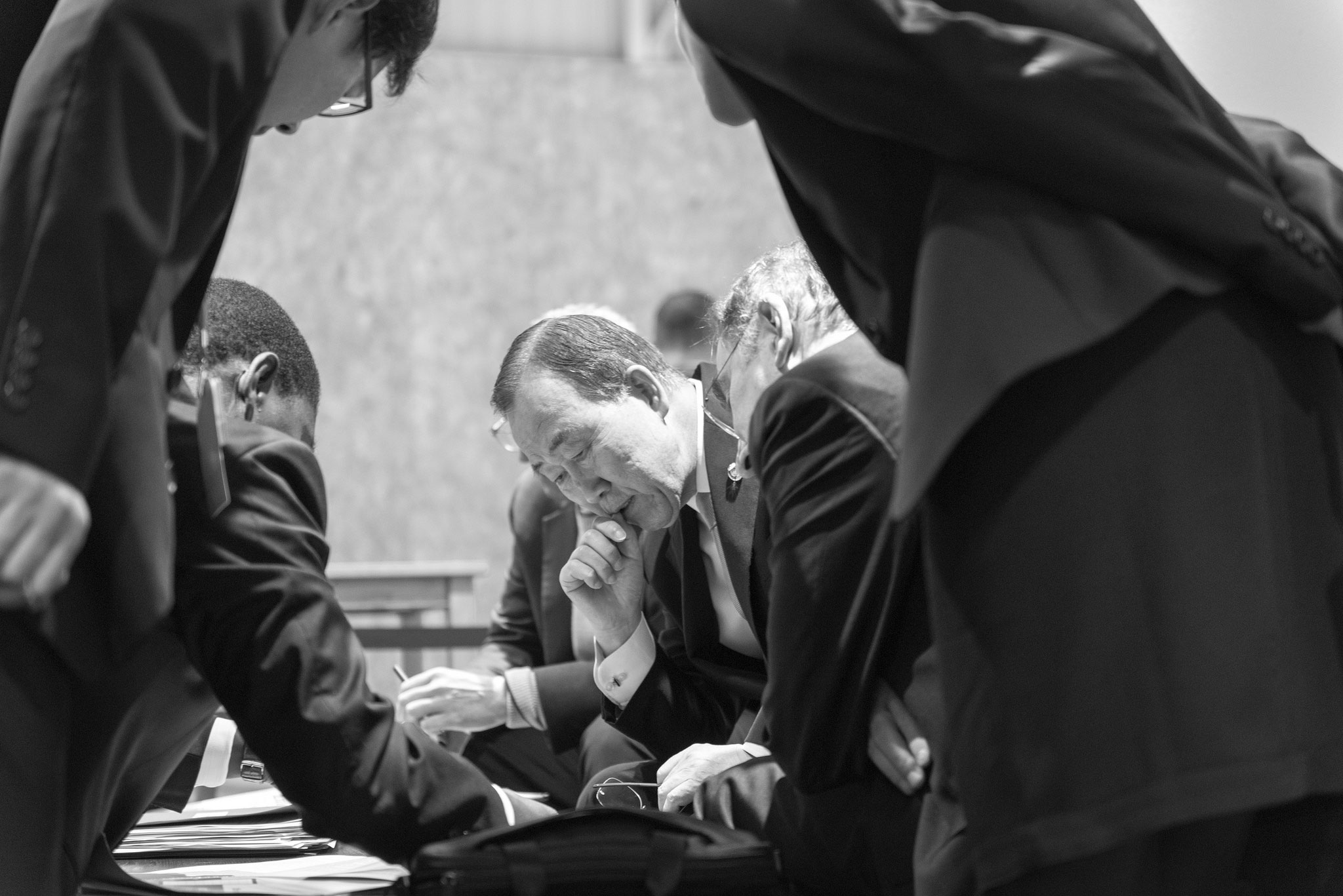
UN Secretary General Ban Ki-moon, discussing a draft text of the Paris Agreement with advisors in December of 2015. (Photo: UN Photo/Mark Garten, Flickr CC BY-NC-ND 2.0)
CURWOOD: It’s Living on Earth, I’m Steve Curwood. More than 60 nations now have ratified the Paris Climate Agreement and that is more than enough for the accord to take effect. But there’s another hurdle...countries responsible for at least 55 percent of total global greenhouse gas emissions also have to ratify the pact. The process is moving quickly, in comparison to the eight years it took for the Kyoto Protocol to go into effect, and observers predict that 55 percent threshold for Paris will be reached shortly. I asked David Waskow, the International Climate Change Director of the World Resources Institute just where things stand right now.
WASKOW: Well, we're getting very close to what is a very significant moment. We've crossed the threshold for the number of countries. There are now 55 of them who have ... more than 55 who have joined the Agreement. We're up over 60 in fact, and we're closing in on the other threshold, which is to have more than 55 percent of global emissions represented. As of last week at the major event at the UN, we reached 48 percent. India has now indicated Prime Minister Modi has said that India will join on October 2, and so with that we will be at about 52 percent commission. So clearly, really closing in on that 55 percent level that's needed to go into force, and we have other countries that have said they're going to do so this year, so really the question is when that happens.
CURWOOD: So which countries are near to acceding to the agreement that would put it over the limit?
WASKOW: Well, we have a bunch that I think may move quite soon. So Japan is one of those, and they have a special meeting of their legislative body, the Diet, that may do that. The European Union is having a special meeting of its council, the European Council, on Friday this week and this is slated to be on the agenda, and so they may make a major step forward, and then there are some other countries as well.
CURWOOD: So, we're talking about September 30 that the Europeans would be meeting.
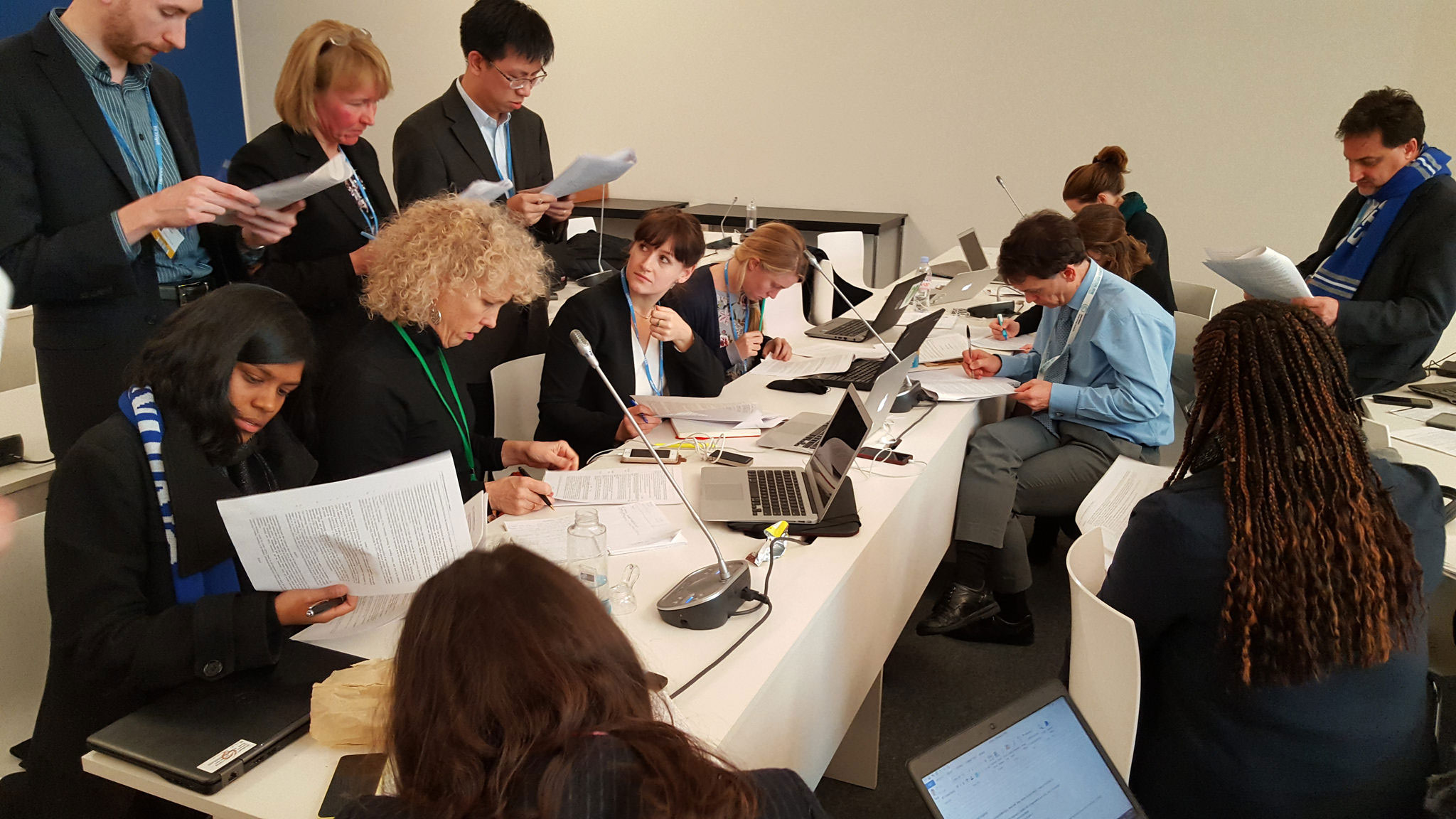
The WRI staff “crunching through new text” during the UN Paris Climate Summit in December of 2015. (Photo: World Research Institute, Flickr CC BY-NC-SA 2.0)
WASKOW: That's right, and their process may take several days to fully wrap up, but there's quite a decent prospect that they would move forward, and then there's some other countries that I think sort of are on the verge as well, Canada and South Korea in particular.
CURWOOD: So what are the important deadlines in this process? I'm thinking, of course, here in the United States, we're focused on the November election day but what's on the UN calendar?
WASKOW: Sure, well there's been a lot of attention given to having the agreement enter into force this year, which would mean crossing that threshold by the end of the year, but we may get there quite a bit sooner. The dates to have in mind are, first of all, the next conference of the party, the COP for the UN climate negotiations. That's when all of the countries come together each year and this is COP 22, it will take place in Marrakesh, Morocco, this time, and it starts on November 7, actually, the day before the US election. If enough countries come on board the agreement and that 55 percent threshold is crossed by October 7, a month ahead, then in fact that meeting in Marrakesh would become the first formal meeting of the Paris Agreement of all the countries that are party to the Paris Agreement.
CURWOOD: So what are the odds of making that October 7 to actually have this first meeting of the Paris climate Agreement this year?
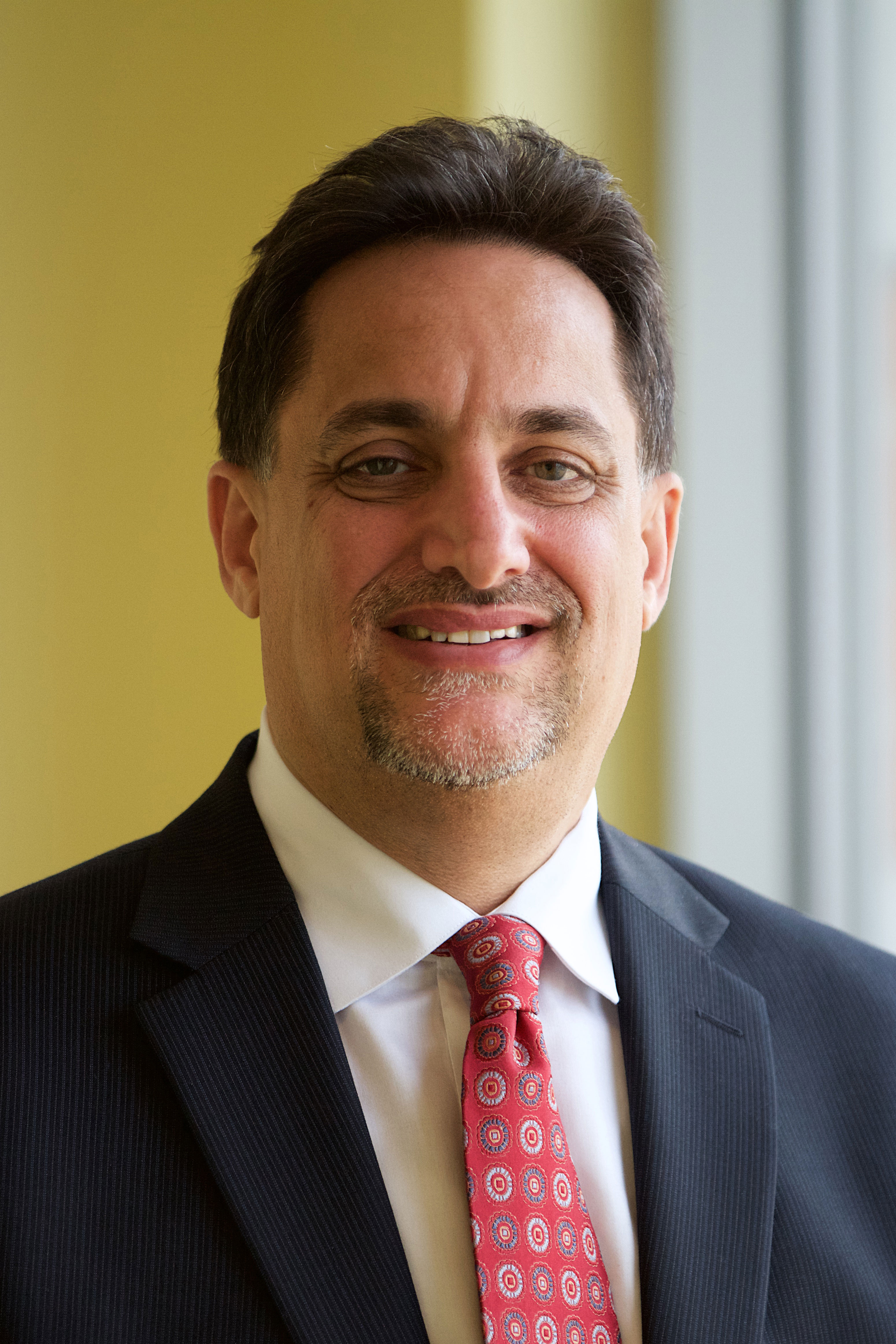
David Waskow is the Director of the World Resources Institute’s International Climate Initiative. (Photo: David Waskow / World Resources Institute)
WASKOW: Well, I think it's certain now that we will have entry into force this year. Now whether that meeting in Marrakesh is that first formal meeting of the Paris Agreement is still an open question, but we seem in quite good shape for that to happen. If, for example, Japan or the European Union were to join the agreement before October 7, then in fact, that meeting in Marrakesh would become the first Paris Agreement meeting or if a combination of other countries, for example, Canada and South Korea.
If they both join, that would put us over the threshold too by October 7. That's quite plausible, and so I think we're looking at a very high likelihood, in fact, of having that Marrakesh meeting be a quite important one, one that really makes clear the global support for the agreement and puts in motion the operational elements of the agreement as well.
CURWOOD: David Waskow is the International Climate Director for the World Resources Institute. Thanks, David, for taking the time with us.
WASKOW: Thank you so much.
Related links:
- Paris Agreement Tracker
- 22nd Conference of the Parties in Marrakech, Morocco
- World Resources Institute Climate Initiative website
[MUSIC: Toumani Diabeté's Symmetric Orchesta “Tapha Niang” , Boulevard de l’indépendance 2006 Nonesuch]
SEC Probes Exxon

Exxon is under scrutiny from the U.S. Securities and Exchange Commission regarding its asset valuations in the face of lower oil prices and climate change regulatory risks. (Photo: Thomas Hawk, Flickr CC BY-NC 2.0)
CURWOOD: In order to limit global warming to two degrees Celsius or below by the end of the century, as the Paris Agreement calls for, oil and gas companies will have to limit how much fossil fuel they can ultimately extract from the ground. That raises questions for shareholders - and regulators - about the possibility of stranded assets. Exxon Mobil is already under public scrutiny for allegedly hiding the truth its researchers had discovered about climate change, with attorneys general from the states of Massachusetts and New York conducting probes. Now the federal Securities and Exchange Commission is investigating how ExxonMobil values its assets, with lower oil prices and climate change regulations set to become tougher. Among those following this case is Andrew Logan, Director of Oil & Gas and Insurance Programs, for Ceres, a non-profit coalition of companies and investors concerned about sustainability, who joins us now. Andrew, welcome to Living on Earth.
LOGAN: Thanks for having me.
CURWOOD: So, first tell me, what does this Securities and Exchange Commission investigation involve?
LOGAN: Sure, it really involves two, in a way very simple questions: did Exxon violate accounting principals or mislead investors by failing to recognize what are called impairments of its assets anytime in the last couple of years. So, essentially the idea is, if the price of oil goes down, one would assume that the value of your assets as an oil company would go down, and if look across the industry, there have been hundreds of billions of dollars of assets that have written down essentially by every company except Exxon. And so, the question from the SEC is what makes Exxon so special if it doesn't have any assets that are being devalued, and the second, and I think more interesting part of the investigation is whether Exxon calculated the potential impacts of climate policies on its business in a way that was accurate and fair to investors.
CURWOOD: So, Andrew, briefly give us the backstory. Why is the Securities and Exchange Commission looking into Exxon's valuation practices? What's the origin of this investigation?
LOGAN: Sure, the origin goes back quite a while. If you want to trace the story to the beginning, it goes back at least 10 years to when a group of investors began raising real concerns about Exxon's business strategy in a world that is beginning to take climate change seriously and the concern there is really, if you look at the oil industry. These are companies that are investing for 10, 20, 30, 40 years in the future, and Exxon continues to make these investments in a way that assumes that the world would continue depending on oil and gas for most of its energy needs, and that the world wouldn't take any serious action on climate change.
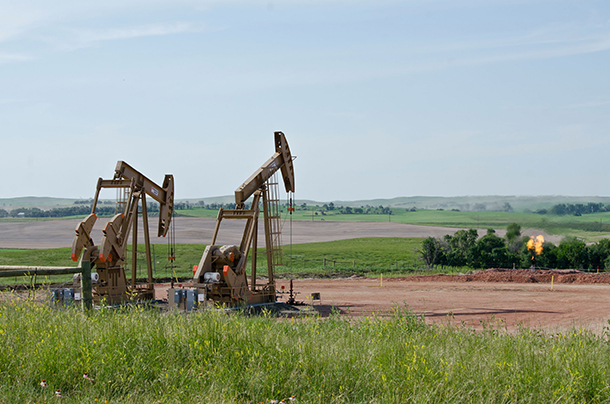
Unlike its peer companies, Exxon Mobil has not “written down” the value of its oil and gas reserves despite the steep decline in crude oil prices that began in 2014. (Photo: Tim Evanson, Flickr CC BY-SA 2.0)
And I think, what we've seen in the last 18 months is that the world has changed in a very fundamental way. With the Paris agreement we have a real path forward on climate policy. We've seen significant innovation in technologies around electric vehicles and renewables. And so it looks like we're heading to a very different future from the one that Exxon is planning for. You know, I think we're beginning to see other companies whether it's Conoco-Phillips or Toal or Statoil realize the need to diversify their business away from fossil fuels. You see Total putting a lot of money into solar, into batteries for energy storage. You see Statoil putting a lot of money into wind. So, the industry is beginning to move, and there's a very real risk that Exxon and its investors are left behind.
CURWOOD: So, the Securities and Exchange Commission is looking at Exxon's longstanding practice of not lowering the value of its oil and gas reserves when prices fall and, of course, with the threat of more regulation of carbon. Walk me through some numbers if you have them, Andrew, about how Exxon's valuations compare to what's going on in the rest of the industry.
LOGAN: Sure. Well, I think over the last couple of years, with the price of oil falling very precipitously, from over $100 to now in the mid $40s, I think we've seen every major oil company from Chevron to Conoco to BP to Shell write-off in many cases, $10s of billions of dollars in assets. I think cumulatively, it's around a $400 billion dollar write-off across the industry. And that's something that the industry does on a regular basis when prices go up and down. If something you invested in that only makes money at $80 a barrel and the price is now down to $40 or $50, maybe it's not a viable project anymore, and so you can't carry it on your books as an asset. Where Exxon is different is that it clings to this view that eventually the price of oil will go back up to where it was before.
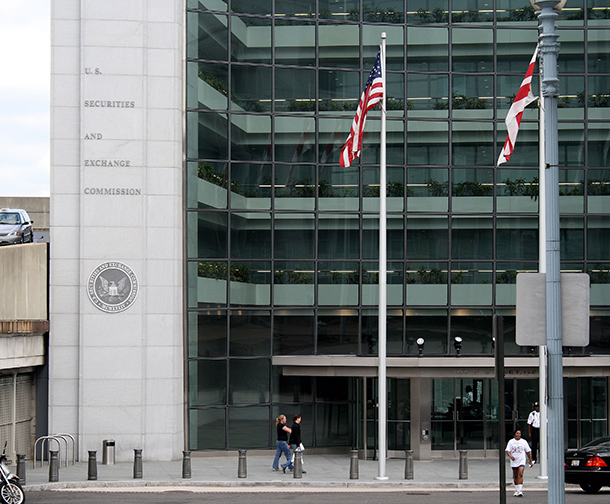
The headquarters of the U.S. Securities and Exchange Commission in Washington, D.C. (Photo: arsheffield, Flickr CC BY-NC 2.0)
CURWOOD: Well, one would think that in some respects they're right probably over the short-term. They may see a price increase to demand, but, of course, over the long-term science is telling us that for the planet to survive we've got to get out of burning fossil fuels.
LOGAN: Right. And you know I think the SEC doesn't allow you to simply to use your own beliefs or hopes in when it comes to accounting for your assets, and so, whatever Exxon believes about their future has to go by what the facts are on the ground and the fact right now is that the Paris Agreement is heading toward being put forth and that is going to have a very real impact on demand for oil and for the price of oil.
CURWOOD: So, how have shareholders responded to the increased public scrutiny Exxon’s policies involving climate disruption?
LOGAN: Well, it's interesting. The shareholders have clearly gotten the message that times have changed, and that the post-Paris world is a very different one for the fossil fuel industry. We’ve seen a lot of pressure from very large, very conservative investors on the company to change both its disclosure on climate change and some of its actions. So, in the spring in the run up to the Exxon-Mobil annual meeting, we saw investors with over $10 trillion in assets come out and publicly call on the company to change its stance and its actions on climate change. So, to me that was a real change in the way that investors have been looking at this company. I mean, it wasn't so long ago that Exxon really was a gold plated company that no one thought could do any wrong, and in a matter just a couple of years that has just completely turned around.
CURWOOD: Andrew, what action could the Securities and Exchange Commission take if the agency finds out that Exxon-Mobil has acted inappropriately regarding informing folks about their accounting and other disclosures regarding climate change?
LOGAN: As a public company, you never want to have the FCC come knocking on your door. And I think it could end in all sorts of ways. It could result in anything from no action at all, to an agreement with a company that changes disclosure and accounting practices, to something much more severe like a large financial penalty or a civil or criminal action. You only have to look at the last decade of SEC enforcement actions against accounting firms and banks, multi-billion dollar fines, to see how large the penalties can be.
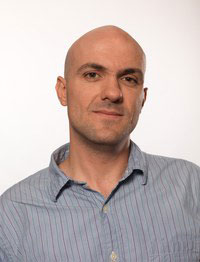
Andrew Logan is the director of the Oil & Gas and Insurance Programs at Ceres. (Photo: Ceres)
I think as well, in a way the greatest risk that this investigation poses for Exxon is that it has the potential to really undermine investor confidence in the company. With the banks, the allegation was essentially just a perversion of their normal business practices. They were doing mortgage loans in ways that were shady are improperly disclosed. With Exxon they really are looking at the very core business of the company and a valuation of the assets without which the company has no value. So you have to assume that any outcome here where the SEC wins is one that is going to have a very profound impact on Exxon and its investors.
CURWOOD: Andrew Logan is the Director of Oil and Gas and Insurance Programs at Ceres. Thanks so much, Andrew, for taking the time.
LOGAN: Thanks for having me.
CURWOOD: We contacted Exxon for comment. Media relations manager Alan T. Jeffers sent us a statement which is posted on our website LOE.org. It reads in part:
"We are fully complying with the SEC request for information and are confident our financial reporting meets all legal and accounting requirements."
------------
WRITTEN STATEMENT from Exxon Mobil Corp. spokesman Alan Jeffers regarding the investigation:
“The SEC is the appropriate entity to examine issues related to impairment, reserves and other communications important to investors.
We are fully complying with the SEC request for information and are confident our financial reporting meets all legal and accounting requirements.”
Related links:
- The Wall Street Journal: “SEC Probes Exxon Over Accounting for Climate Change”
- Earlier this year, the New York state pension fund officials confronted Exxon on climate risks to pensions
- Investigative reporting alleges that Exxon denied its own climate research
- A conversation with Senator Sheldon Whitehouse on Exxon and the climate
- ExxonMobil: “We are dedicated to reducing the risk of climate change”
- About Andrew Logan
[MUSIC: Kayhan Kalhor, “Introduction,” Scattering Stars Like Dust, Traditional Crossroads Records]
Paris Dirty Car Ban
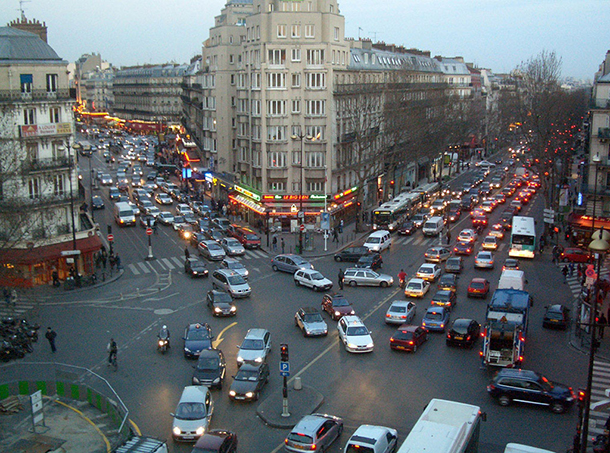
Traffic contributes to nitrous oxide, or nox, and PM 2.5 pollutants in the city of Paris. (Photo: Daxtell, Wikimedia Commons CC BY-SA 3.0)
CURWOOD: Paris is famous for many things -- fashion, art, cafes and revolution. And now it’s created a new kind of revolution. The City of Light went car free for a day, on September 23, to allow Parisians to stroll down the Boulevards of the city center, and get to the Eiffel Tower and Arc de Triomphe without choking on fumes. It’s part of a wider attempt to fight pollution that now bans cars built before 1997 on the city’s streets during the busy part of weekdays. We called up Hervé Levifve, a transportation expert in the Paris deputy mayor’s office to find out what the ban actually covers.
LEVIFVE: The new car ban will affect any vehicle who is driving inside the city of Paris from motorcycle to heavy goods vehicles. Since the first of last July this year, cars manufactured before 1997 cannot be used in Paris from Monday to Friday between 8 a.m. and 8 p.m. Our target is to remove, from day to day, circulation all pollutant vehicles used for commuting, but people can still use old cars during the weekend.
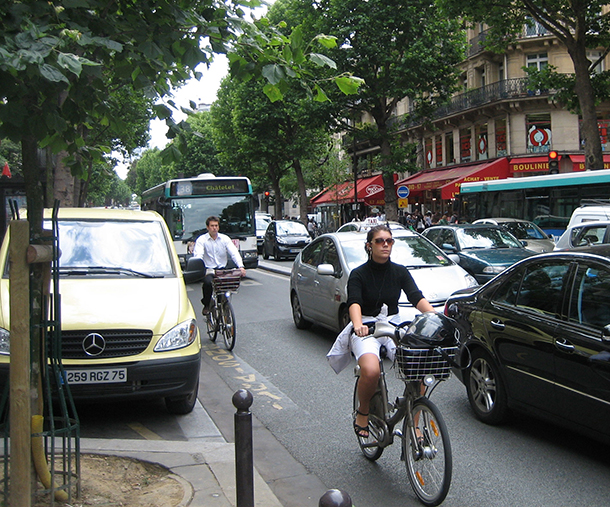
Paris has created incentives for commuters to replace their old cars with bicycles or public transportation. (Photo: Eurist e.V, Wikimedia Commons, CC BY 2.0)
CURWOOD: Now how bad is the air in Paris? I know that one point a couple years ago it had the worst air of any city on the planet, but to what extent has that persisted?
LEVIFVE: Today we have some survey, which says that half of citizens of Paris are exposed to a bad quality of air. We know also for sure that every year 2,200 people are dying because of air quality. It's the sole cause of death in Paris just after alcohol and tobacco. We are not complying to European standards, limits. Half of the citizens of Paris are largely above the European limitation so we need to do something.
CURWOOD: Now, how much of this air pollution do the older cars cause?
LEVIFVE: We know for sure that transportation has an impact on NOx emissions, on particulate emissions. For particulates, transportation is 60 percent of emissions and for NOx it's 74 percent of emissions and we know that all these old cars, they are responsible for five percent of NOx and three percent of particulate matter 2.5.
CURWOOD: In other words, the older cars cause twice as much pollution kind of on average compared to newer cars.
LEVIFVE: Yeah.
CURWOOD: So how are these new regulations going to affect the environment do you think? How much pollution can you reduce?
LEVIFVE: We know for sure that we will reduce emission of NOx and particulate matters until five percent or above, but this is only the first step and there would be other steps next year to ban diesel vehicles in 2020.
CURWOOD: So, no diesel vehicles at all inside the city of Paris by then?
LEVIFVE: Yes, that is the objective.
CURWOOD: Well, how does the steps that you're taking in Paris compare to what other cities are doing in Europe?

The new rules apply within the boundaries of Boulevard périphérique de Paris
(Photo: Gregory Deryckére, Wikimedia Commons CC BY-SA 3.0)
LEVIFVE: We are quite late in Paris because since 20 years now, there was about 200 low-emission zones in different cities in Europe, sometimes it was very big low-emission zones, like in London it was 1,700 square kilometers. Sometimes it’s very tiny like in some cities in Italy. But today in Paris what is different is that we are banning all types of vehicles, from motorcycle to heavy goods vehicles. A lot of other cities in Europe are only focusing on heavy good vehicles or motorcycles or light vehicles.
CURWOOD: How are people reacting to all of this?
LEVIFVE: Parisian people are very very few motorized. Only 40 percent of households in Paris has a car. So, a majority of the population of today is respiring bad air quality and few people are using cars and polluting. And so, even if some people are quite upset because they will not be able to use their car anymore, the majority of people are very happy that we are doing something against pollution.
CURWOOD: So, a minority of folks are making bad air for everyone right now.
LEVIFVE: Yes, it's something like that.
CURWOOD: What kind of incentives is the city offering to help people comply with this?
LEVIFVE: We have two kinds of incentives. The first one for Parisian people is an incentive when you get rid of your old car, you can have some funding for public transport, for buying a bicycle, electric bicycle, or something like this. We are not helping people to buy a new car. And for professional activities like plumbers, like deliverymen and so on, we have some incentives to help them to buy more clean vehicles.
CURWOOD: So, what kind of exceptions, if any, are there?
LEVIFVE: There are some exceptions. For example, disabled people who need the car, can use the car if it's before 1997. For example, also vintage car have special authorization to be used in Paris.
CURWOOD: So, what are the other actions that Paris has tried to limit pollution from vehicles?
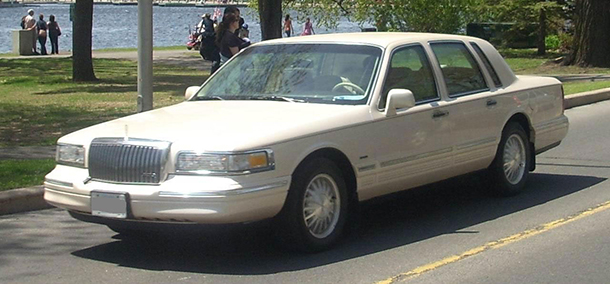
Residents of Paris will still be able to use cars built before 1997, like this Lincoln Town Car, at night and on the weekends. (Photo: Bull-Doser, Public Domain)
LEVIFVE: There is a lot of action about mobility. For example, we have a very huge plan to promote the use of bicycles. We will spend 150 million Euros until 2020 to create bicycle lanes, to create parking stations for bicycles. Today we have five percent of people using bicycles today. Our goal is to have 15 percent of people using bicycles, so we will triple the number of bicycles in Paris. Our plan is to remove some lanes for cars and replace them by lanes for bicycles in order to make it more safe and so on. For example, in Paris there is a motorway along the Seine River in the center of Paris.
CURWOOD: Indeed.
LEVIFVE: This motorway will be closed for cars beginning next October, it will be replaced by pedestrian and cycle ways. We also have some projects about public transport with a new cable car, with new hybrid transit inside Paris and a lot of little things like this.
CURWOOD: Hervé Levifve is with the Deputy Mayor for Transport in Paris, France. Thanks so much for taking the time with us today.
LEVIFVE: Thank you for listening to me. Bye bye.
Related links:
- More information about the Paris car regulations
- Interactive map of other urban access regulations in Europe
- The official website for the Paris car regulations (in French)
- European Mobility Week
[MUSIC: Broadway pit orchestra, “An American In Paris,” An American In Paris – Original Broadway Cast Recording, George Gershwin/Ira Gershwin/arr.Rob Fisher, Masterworks Broadway]
CURWOOD: Coming up, how some young and hungry urbanites are finding food in plain sight. That’s just ahead here on Living on Earth. Stay tuned.
ANNOUNCER: Funding for Living on Earth comes from you our listeners, and United Technologies --combining passion for science with engineering to create solutions designed for sustainability in the aerospace, food refrigeration and building industries. UTC companies such as Otis, Carrier, Pratt & Whitney and UTC Aerospace Systems are helping to move the world forward. This is PRI, Public Radio International.
[CUTAWAY MUSIC: [MUSIC: Broadway pit orchestra, “An American In Paris,” An American In Paris – Original Broadway Cast Recording, George Gershwin/Ira Gershwin/arr.Rob Fisher, Masterworks Broadway]
BirdNote: Sandhill Cranes Wait Out the Storm

The sandhill crane is a large crane native to North America. (Photo: Mike Hamilton)
BIRDNOTE®/ SANDHILL CRANES WAIT OUT THE STORM
CURWOOD: It’s Living on Earth, I’m Steve Curwood.
[MUSIC - BIRDNOTE® THEME]
CURWOOD: Poet John Keats claims that autumn is the season of mists and mellow fruitfulness.
But in some places, it can also be a season of wild storms – and that can upset migration plans, as Mary McCann explains in today's BirdNote®.
BirdNote®
Sandhill Cranes Wait Out the Storm
[Severe wind whips through the antennas of a gillnet boat]
MCCANN: “I used to gill-net salmon in Alaska,” writes BirdNote listener, Misha Noonan.
“At the fall equinox, we’d often get stuck at the far east end of the Copper River Delta, waiting out the storms.
[Continue opening sounds and crashing waves]
Once the storms were so unrelenting, that not only were fishermen unable to return to Cordova, but Sandhill Cranes were unable to proceed with their southeast migration.
[Calls of a large congregation of Sandhill Cranes]
Every morning, a test flight of scouts would lift off and attempt to get around a nearby cape. The birds aloft chattered to the birds in the slough; the birds in the slough answering excitedly. But it wouldn't be long before the tone changed, in my opinion, from one of excitement to one of disappointment as the scouts had to turn back.
The 10th morning broke calm and clear. The scouts lifted off at first light. Everyone was awake – cranes, fishermen, ducks, geese, everyone. The scouts called loudly and excitedly to the flock on the ground. You could imagine what they might have been reporting: “1,000 feet, clear and calm. 2,000 feet, visibility unlimited! 3,000 feet, we're around Kayak Island and outta here!" Soon, 10,000 Sandhill Cranes filled the sky.
[Calls of a large congregation of Sandhill Cranes]
In 20 minutes… they were gone….Silence. The rally of the Sandhill Cranes was over... for another year.”
I’m Mary McCann.
###
Written by Misha Noonan
Sounds of provided by The Macaulay Library of Natural Sounds at the Cornell Lab of Ornithology, Ithaca, New York. Recorded by
Producer: John Kessler
Executive Producer: Chris Peterson
© 2012-2016 Tune In to Nature.org September 2016 Narrator: Mary McCann
http://birdnote.org/show/sandhill-cranes-wait-out-storm
CURWOOD: For pictures, migrate on over to our website LOE.org.
Related links:
- Listen on the BirdNote website
- Audubon information on sandhill cranes
[MUSIC: Darol Anger-Barbara Higbie Quintet, "Egrets."]
Beyond the Headlines
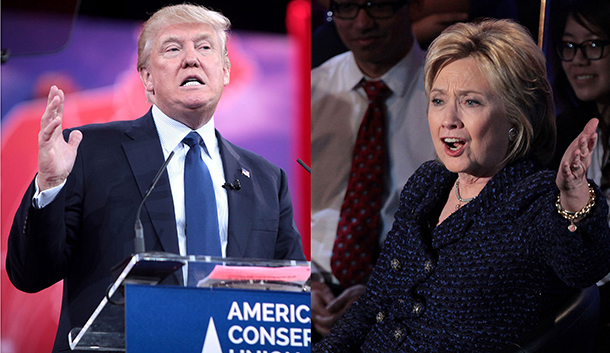
Presidential candidates Donald Trump and Hillary Clinton went head-to-head in the first debate of the 2016 election cycle. Climate change was among the issues mentioned, though it was not prompted by a question from the moderator Lester Holt. (Photo: Gage Skidmore, Wikimedia Commons CC-BY-SA-3.0).
CURWOOD: Off to Conyers, Georgia now, to dig beyond the headlines with Peter Dykstra. He's with DailyClimate.org and Environmental Health News, that’s EHN.org and he's on the line now. Hi there, Peter.
DYKSTRA: Hi, Steve. Hey, how ’bout that debate a few days ago?
CURWOOD: Oh yeah, one more Presidential debate where the moderator isn’t interested in asking about climate change, right?
DYKSTRA: Nope, not a single question in any of the Presidential debates four years ago, and none this time from moderator Lester Holt, but without prompting from the moderator, both Donald Trump and Hillary Clinton made mention of it. Late in the proceedings, Mr. Trump ridiculed the position held by his opponent, and by President Obama, that climate change is a major threat to global security.
CURWOOD: Oh you know another place where that’s accepted as fact is the Pentagon. Hey, remind us what Hillary Clinton said.
DYKSTRA: Well, she gave a plug for clean energy and pointed out that Donald Trump has repeatedly called climate change a hoax. Trump denied ever having said that, as if the multiple times he has said exactly that on Twitter and in interviews aren’t available for the world to see.
CURWOOD: So let’s see -- he denies his own denial?
DYKSTRA: Precisely. And the day after the debate, his campaign manager, Kellyanne Conway, said he does believe in climate change, but that it has nothing to do with human activity. But his running mate Mike Pence said this week that climate change is real and human-caused.
CURWOOD: OK. Well, there are supposed to be two more presidential debates in October -- let’s see if there’s a climate question then.
DYKSTRA: Yeah let’s see. But here’s a couple more election-related notes: Donald Trump chose the leader of his transition team for the Environmental Protection Agency last week, and it’s Myron Ebell, a Washington lobbyist who’s pretty much made a career out of trying to destroy the EPA.

Donald Trump announced that, if he is elected president, Myron Ebell will lead the Environmental Protection Agency. Ebell is the director of the Center for Energy and Environment at the Competitive Enterprise Institute, an organization which works to question many of the regulatory policies of the EPA. (Photo: U.S. government work, Wikimedia Commons public domain)
CURWOOD: Have the fox guard the henhouse?
DYKSTRA: Well let’s keep it in the political vein -- it’s a little like appointing white supremacist David Duke to run the Civil Rights Commission.
CURWOOD: Ouch.
DYKSTRA: And Steve, I wanted to mention one poll -- well, it’s sort of a poll, where Trump holds a better than three-to-one advantage over Hillary Clinton.
CURWOOD: Oh, what’s that?
DYKSTRA: The makers of the Chia Pet say sales of the Donald Trump Chia Pet is winning in a landslide -- 78 percent to 22 percent for the Hillary Clinton Chia Pet.
CURWOOD: Oh thanks for that seedy bit of election intelligence. What’s next?
DYKSTRA: People tend to throw around the term “game changer” pretty casually, but here’s a number that may well be a true game changer for the energy industry. The International Energy Agency says that investment in new oil and gas production took a dramatic drop of about 25 percent in 2015.
CURWOOD: We’re talking about huge here, and maybe that’s an omen for where we’re headed. Did they give reasons for the drop?
DYKSTRA: Well, there’s no single reason for it, but as wind and solar power becomes cheaper and more competitive, they’re leaving their mark. And so are the potential demands of the Paris Climate Accord. The biggest single reason comes from the oil and gas industry itself: prices have dropped so much that they’re not as attractive an investment. IEA also says it expects investments in oil and gas to continue to decline in future years, but maybe not by 25 percent a year.
CURWOOD: Still, that could really be a big game-changer. Well Peter now it’s time for our weekly environmental history lesson. What have you got?
DYKSTRA: Last week I attended the annual conference of a group we both belong to and both admire, the Society of Environmental Journalists. We heard from speakers like California Governor Jerry Brown and had several days’ worth of deep discussion on the science, and politics, and economics of all the issues we cover here and others cover in news outlets all over the world.
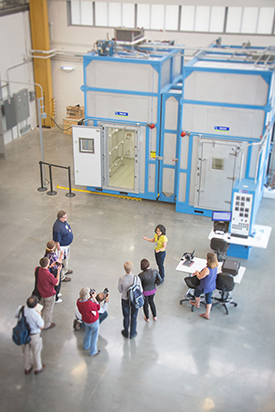
Journalists from SEJ toured Oak Ridge National Laboratory as part of the 2013 annual conference (Photo: Oak Ridge National Laboratory, Flickr CC BY-NC-ND 2.0)
CURWOOD: Yeah, and SEJ has been around just about as long as Living On Earth has been on the air.
DYKSTRA: Right, in fact the first SEJ conference was 25 years ago this week in Boulder, Colorado. A lot has changed since then, but a lot hasn’t. Despite at least twelve Pulitzer Prizes won by environmental writers and reporters, in some places we’re still regarded as the gum on the bottom of journalism’s shoe. Which brings us to an epic tale that helped inspire the founding of the organization.
CURWOOD: This wouldn’t be the story about a famous TV reporter would it?
DYKSTRA: It would indeed. Back in 1989, Sam Donaldson of ABC News -- folks might remember him as the alpha dog in the White House press corps, shouting questions at President Reagan in his deep baritone voice. Well, he was interviewed as he left the White House beat to host a weekly show and the reporter asked him if this was a demotion. Sam explained what a true demotion and shaming would be for a star reporter and he said, “It’s not like I’m being shifted to the ecology beat.”
CURWOOD: Thanks a lot, Sam. And there are big changes afoot at Society for Environmental Journalists, right?
DYKSTRA: There are. Beth Parke signed on as SEJ’s Executive Director shortly after its founding, and she’s moving on after a quarter-century of great leadership. It’s been a tough week for me, Steve. Not only did Vin Scully and David Ortiz retire from baseball, but Beth Parke is walking away. They’re all leaving great legacies behind.
CURWOOD: She is in their league.
DYKSTRA: Not withstanding the non-profit pay grade.
CURWOOD: [LAUGHS] Yeah. Peter Dykstra is with Environmental Health News, that’s EHN.org and DailyClimate.org. We’ll talk to you again real soon, Peter.
DYKSTRA: Thanks, Steve. Talk to you soon.
CURWOOD: And there’s more on these stories on our website, LOE.org.
Related links:
- Republican vice presidential candidate Gov. Michael Pence on climate.
- Kellyanne Conway on Trump and the climate
- Clinton and Trump Chia Pets
- IEA report on energy investment
- SEJ website
- State of Environmental Journalism
[MUSIC: Katie Webster, “Two Fisted Mama,” The Alligator Records 20th Anniversary Tour, Webster & Iglauer/Eyeball Music, ALCD]
Urban Foraging at the End of Nature

In her hometown of Albuquerque, Amaris Ketcham picks the fruit off of prickly pear cacti. Known as tunas, these fruits can be made into jellies, candies, drinks, salads, and tarts. (Photo: Corey Leopold, Flickr CC BY 2.0)
CURWOOD: Back in the late 19th century, writers including Henry David Thoreau and John Muir were producing compelling studies of nature and the landscape. Some wrote towering prose on the sublime character of the nonhuman world and glorified wilderness. Some examined the intricacies of the natural world to learn its secrets. Then 27 years ago, Bill McKibben wrote “The End of Nature,” noting a world where no part of the landscape is untouched or unaffected by humans. And writers of the millennial generation came of age in the shadow of this mediated nature. Many of these new writers grew up in urban landscapes, during economic recessions, where the “end of nature” can seem all too real. Now there’s an anthology of essays written by Millennials, with an introduction from Bill McKibben, called Coming of Age at the End of Nature. Today we have the first of these essays.
KETCHAM: Hi I’m Amaris Ketcham. I'm an honorary Kentucky colonel and an assistant professor at the University of New Mexico where I teach creative writing and graphic design. Kentucky disbanded its militia after the War of 1812, and since then, to be a colonel is a honorary status and it just is basically title that it's given by the governor and it means you're sort of an ambassador, cultural ambassador, to Kentucky.
CURWOOD: Amaris Ketcham says she came of age at – in Bill McKibben’s phrase, the end of nature, and she’s typical of many of her generation, who are frequently lowly paid, ambitious and idealistic, and also often hungry. In this excerpt from her essay, “Urban Foraging,” she explains how she and her friends sometimes cope.
KETCHAM: We've got tricks to get grub. We're specialized. We convene and share our food. We're underemployed, staffers at local nonprofits because we believe in a more sustainable future and our hearts are in the right places, and nonprofits know how to take advantage of youth. I'm mostly living on black beans and rice and in the summer, fresh fruit. I gather the fruit from the neighborhood trees. I've always foraged around the house. I'm from the country.

A practiced eye can find edible treasures all across the built landscape. Vacant lots, playgrounds, city parks, and apartment complexes are just a few places where aspiring foragers should look. (Photo: Katie Hargrave, Flickr CC BY 2.0)
You can catch and boil tiny crawdads and minnows from the creek, steal pears from someone else's tree and taste test foliage and berries for edibility. I only got poisoned once after dining on several apples that must've been a little funky because I spent the next day suffering from dizziness and headaches. Still, I've gotten more food poisonings more often from cheap restaurants than the trees.
One neighborhood I lived in had so much food in the summer and fall that drew a map detailing the locations of apples, apricots, blackberries, pears, plums and raspberries so I wouldn't forget the following year. Other goodies grew in yards: chamomile, clover, dandelions, lavender, nasturtium, and rosemary. Oh, I never asked permission. I chose plants in abandoned lots of apartment complexes before venturing onto private property. Usually, it was sunny outside and there were people around. When these people saw me picking fruit they would stop to join me.
So, I live in Albuquerque and actually have a quite a few apricot trees here. We have plum trees, cherry, fig -- fig and pomegranate grow really well in Albuquerque. In addition to that, there's various kinds of cactus. So, many people have prickly pear cactus in their yard. The fruit is called atuna. You can eat that. There is also wild mustard and various small plants that are edible in this city.
I think that there is a sense of community that can develop it, because it's often an experience that people haven't shared with others. For example, there's a scene in my essay where I talk about going to an apartment complex that has a plum tree, and as soon as I started picking plums, people came out of the apartment complex and they were like, "I didn't realize I could pick plums from this plum tree. Do you know how to make a pie?" Then, a car of these guys who looked like thugs got out and were like, "Is this your plum tree? Can we have plums?" So then, they started enjoying the plums, and then some teenagers came over, and within 10 minutes there was this sort of instant community, people from many walks of life all hanging out at this plum tree eating fresh fruit.

Amaris Ketcham teaches writing and interdisciplinary studies at the University of New Mexico Honors College. Her essay “Urban Foraging” is featured in the new collection Coming of Age at the End of Nature. (Photo: Stephanie Stewart)
I think maybe we view urban life as a series of destinations, and going from one destination to another destination, and not stopping en route to communicate with people. If you're on foot more, if you bicycle more, you start interacting with the route more than you interact with the end of the route. You know we inhabit an artificial reality for the most part. I live in an urban area. It's man made, and by artificial, I just mean that it's man made. I don't mean that it's negative or false somehow. The idea that we've built buildings, we landscape our yards, that's not very different from what say prairie dogs do. You don't say prairie dogs are living at the end of nature because they have tunnels and burrows and mounds. And so I think that we are just living in a moment of change, in how we understand nature. However, that doesn't mean that nature is ended or gone.
CURWOOD: Amaris Ketcham teaches at the University of New Mexico. Her essay on Urban Foraging is part of the collection “Coming of Age at the End of Nature, A Generation Faces Living on a Changing Planet.”
Related links:
- Falling Fruit is a crowd-sourced map of global foraging spots
- Here in Boston, the League of Urban Canners provides resources for foragers
[MUSIC: Elizabeth Cotton, "Ontario Blues," Shake Sugaree, Smithsonian Folkways]
[SOUNDS OF FROGS ]
CURWOOD: We leave you this week, mired in a southern swamp….
[MORE FROGS]
A loud chorus of green tree frogs and booming bull frogs is interrupted by the insistent calls of a Limpkin.
[CALLS OF LIMPKIN]
A tall wading bird whose curved bill is well-suited to its diet of apple snails and whose unearthly screams evoke the wildness of its home.
[CALLS OF LIMPKIN]
Lang Elliott and Ted Mack recorded this soundscape on the Wacissa River in Florida for the Nature Sound Adventure series CD Voices of the Swamp.
[MUSIC: Darol Anger with Vassar Clements, “Tone Guys Boogie,” Diary Of a Fiddler, Anger/Clements, Compass Records]
CURWOOD: Living on Earth is produced by the World Media Foundation. Our crew includes Naomi Arenberg, Bobby Bascomb, Aidan Connelly, Savannah Christiansen, Jenni Doering, Emmett Fitzgerald, Jaime Kaiser, Don Lyman, Alex Metzger, Helen Palmer, Adelaide Chen, Jennifer Marquis and Jolanda Omari. Tom Tiger engineered our show, with help from Jeff Wade, Jake Rego and Noel Flatt. Alison Lirish Dean composed our themes. Find us anytime at LOE.org - and like us, please, on our Facebook page -- PRI’s Living on Earth. And we tweet from @LivingOnEarth. I'm Steve Curwood. Thanks for listening!
ANNOUNCER1: Funding for Living on Earth comes you, our listeners, and from the University of Massachusetts, Boston, in association with its School for the Environment, developing the next generation of environmental leaders. And from the Grantham Foundation for the protection of the environment, supporting strategic communications and collaboration in solving the world’s most pressing environmental problems. Support also comes from the Energy Foundation, serving the public interest by helping to build a strong, clean, energy economy, from Gilman Ordway, and from SolarCity, America’s solar power provider. SolarCity is dedicated to revolutionizing the way energy is delivered by giving customers a renewable alternative to fossil fuels. Information at 888-997-1703. That’s 888-997-1703.
ANNOUNCER2: PRI. Public Radio International.
Living on Earth wants to hear from you!
Living on Earth
62 Calef Highway, Suite 212
Lee, NH 03861
Telephone: 617-287-4121
E-mail: comments@loe.org
Newsletter [Click here]
Donate to Living on Earth!
Living on Earth is an independent media program and relies entirely on contributions from listeners and institutions supporting public service. Please donate now to preserve an independent environmental voice.
NewsletterLiving on Earth offers a weekly delivery of the show's rundown to your mailbox. Sign up for our newsletter today!
 Sailors For The Sea: Be the change you want to sea.
Sailors For The Sea: Be the change you want to sea.
 The Grantham Foundation for the Protection of the Environment: Committed to protecting and improving the health of the global environment.
The Grantham Foundation for the Protection of the Environment: Committed to protecting and improving the health of the global environment.
 Contribute to Living on Earth and receive, as our gift to you, an archival print of one of Mark Seth Lender's extraordinary wildlife photographs. Follow the link to see Mark's current collection of photographs.
Contribute to Living on Earth and receive, as our gift to you, an archival print of one of Mark Seth Lender's extraordinary wildlife photographs. Follow the link to see Mark's current collection of photographs.
 Buy a signed copy of Mark Seth Lender's book Smeagull the Seagull & support Living on Earth
Buy a signed copy of Mark Seth Lender's book Smeagull the Seagull & support Living on Earth

